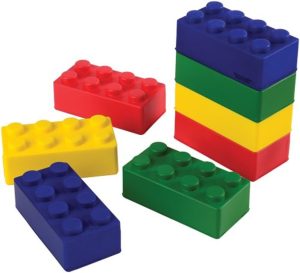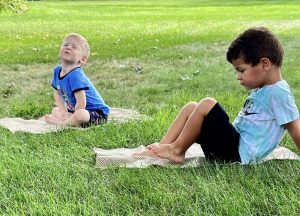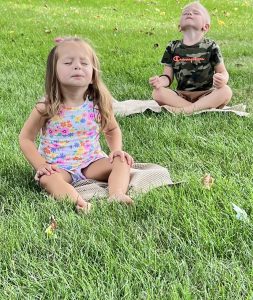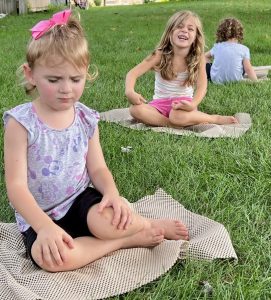In the RIE philosophy, there is a great emphasis on ensuring that caregiving times are relaxed and enjoyable for children and their caregivers. While this might be a dramatic reframe for some– is it really possible to enjoy changing diapers? — it can make mundane tasks much more pleasant.
Family child care is a unique profession– some days drag out, but many others fly by. Taking any opportunity to slow down and be mindfully present with the children is a way to build relationships with each child and ensure that there is time each day spent in warm individual interactions.
The major criterion that makes an activity “want something” quality time is that the adult has an agenda for the child to participate in. This is typically participating in a care task like diapering/toileting, feeding/eating, or dressing. How can these sometimes stressful occasions become enjoyable for everyone? The answer is simple: play!
When a child is getting changed, songs and nursery rhymes (“This Little Piggy”, “Hickory, Dickory, Dock”) have natural gestures that can be incorporated into dressing the child. Taking some pressure off of meals and offering conversation or even calm games for older toddlers, like “I spy on my plate” or discussing the attributes of the meal.
It’s normal for a child to offer some resistance during care times; babies and toddlers try to roll away from diaper changes, or spit out food, or tantrum to avoid getting dressed. Approaching the child in the spirit of collaboration and fun, while not an immediate “cure” for these behaviors, will change the tone of these interactions over time.
Reflection Questions:
- What “want something” times are most difficult right now?
- Consider a child you have struggled to connect with, or who struggles when participating in care tasks: how and when could you use want something quality time to build that relationship?
In the Paths to Quality Standards for Participation, there are 13 standards that family child care providers must meet to move from level 1 to level 2. One practice states:
Each child feels safe, accepted, and protected. This is supported by daily practices that reinforce respect for people, feelings, ideas, and materials.
What does it mean to feel safe, accepted, and protected? What are daily practices that support children in feeling this way? Paying attention to each child and taking advantage of time to connect, even though this is difficult in group care, is a great start. Especially during caregiving times like feeding and diapering/toileting when children are at their most vulnerable. In the RIE philosophy of infant caregiving, this is called “want something quality time.” When the adult has a goal, but it can be accomplished mutually with the child’s cooperation, and the time can be spent in a pleasant interaction with the child rather than rushed through.
This is in addition to “want nothing quality time,” when adults spend time playing with, talking to, and observing children without another agenda. Helping children feel safe also involves self-reflection. Knowing how to handle children’s challenging behaviors is an ongoing process and requires some self-reflection to ensure that adult responses are compassionate and appropriate and demonstrate to the child that the adult isn’t a threat. It’s easy to forget that adults are many times the size of a young child and can easily feel frightening to them. As Circle of Security says, the adult must choose to be “bigger, stronger, wiser, and kind.”
Respect for ideas is simply listening to children and helping them have discussions together in a way that allows for free expression of thoughts without ridicule.
Respect for materials might be more complicated. One of the greatest frustrations in family child care can be broken materials! But daily practices that can support respect for materials might include helping children choose the right materials for their chosen activity (throwing sponge balls instead of blocks), and teaching and modeling appropriate use of materials such as paintbrushes and markers.
Reflection:
- How can you tell when a child is feeling safe?
- What frequent occurrence is most likely to dysregulate you? Spilled paint? Children squealing? How can you proactively support your own wellness and calm?
CACFP Week is a national education and information campaign sponsored annually the third week of March by the National CACFP Sponsors Association. The campaign is designed to raise awareness of how the USDA’s Child and Adult Care Food Program works to combat hunger. The CACFP brings healthy foods to tables across the country for children in child care centers, homes, and afterschool programs as well as adults in day care.
The theme of CACFP Week in 2024 is eating the rainbow!
When you register for National CACFP Week to let us know that you’ll be participating, we’ll send you a sample menu that focuses on eating a different color of the rainbow each day.
Visit the Campaign Page for resources, recipes, advocacy opportunities, and social media contests!
Providing balanced meals and snacks for children can be a challenge. Accommodating different preferences while remaining aligned with CACFP requirements and offering a variety of nutritious foods without large portions winding up in the trash might seem like a distant dream. Often, feeding concerns are really just a venue for power struggle. So how can we help children feel empowered to make their own choices at meal times? Try some of these tips, and see if the emotional climate of your meals changes.
Family style meals: instead of plating food for the children, teach and then allow them to serve their own portions. Even young toddlers can learn to scoop fruit or vegetables onto their own plate, and as they get older, they can build towards pouring beverages. If you’re concerned about your CACFP monitor, 7 CFR 226.20 — Requirements for meals states that when meals are served family style, “A sufficient amount of prepared food must be placed on each table to provide the full required portions of each of the components… for all children or adults at the table and to accommodate supervising adults if they wish to eat with the children and adults.” This means that even if a child initially takes a smaller portion of food than would be required if you had plated it, it still counts as long as there is enough food for them to have taken the full portion.
Modify tools to help children serve themselves: I’ve found that a recycled coffee creamer bottle is a great first tool for pouring milk or water, because the spout is very small and the bottle itself is easy to hold and hard to break. Some other easy and fun ways to help children serve their own food include small tongs or measuring cups, which have higher edges than serving spoons and can facilitate more food getting to the intended dish.
Collaborate with families or look around the world for inspiration for variety. Ask families what their children’s favorite meals are and what their favorite meals were as children. Try the same dish inspired by different cultures. Italian meatballs one week, albondigas the next, and Swedish meatballs after that!
Offer condiments: you can let children serve themselves (try smaller bottles with very small nozzles to prevent spills and overuse) or offer a pre-filled cup of sauce or dressing on the side for children to dip or pour over their food. An empty saltshaker on the table for children to use can also give a sense of autonomy without risking oversalted food.
Invite children to help you plan meals: Bring out the circulars and have them circle a fruit or vegetable they’d like to try. Make sure to give credit when you do serve it– “Thank you for picking out these big green kiwis to try at lunch today, Saamya!”
Don’t shy away from seasoning food well! While we may have an image of children preferring bland foods, often the taste they’re looking to avoid is “bitter”. That leaves a whole world of flavors to explore. Try lemony green beans; add cinnamon, turmeric, and black pepper to sweet potatoes; jazz up cooked zucchini with garlic and a sprinkle of parmesan.
Consider the Divison of Responsibility in Feeding, which states that it’s the adult’s job to offer balanced and nutritious meals, and the child’s job to decide how much of a food– if any– they’ll eat, and listen to their body’s cues. Remember that mealtimes are a way to build community. We don’t just eat for fuel; we share food, memories, and time together. When children are encouraged to participate, but not forced to clean their plate or eat something they dislike, they learn lifelong healthy habits.
Calming spaces in early childhood environments are widespread but creating them with intentionality and teaching children how to use them can be big tasks. When we see disruptive behavior as a sign of a dysregulated child, and provide the tools for that child to re-regulate, we are setting them up for lifelong success as they grow to become people with strong self-regulation and impulse control skills.
These two handouts provide opportunities for you to reflect on how adults use their sensory systems to self-regulate and how to use that information to create calming spaces to support children’s social-emotional development.
This four-part webinar with printable posters and resources from the National Center for Healthy Housing is specifically created for family child care providers to partner with families to prevent children and pregnant parents from coming in contact with lead and take necessary steps to remediate if lead is found in homes or via bloodwork, including links to financial assistance for lead remediation.
Babies born with high levels of lead in their blood are more likely to be born prematurely, be small for their gestational age, and grow more slowly than they should. Children exposed to lead may have developmental delays, learning difficulties, hearing loss, seizures, and more. Family child care providers can be great advocates for families in getting children tested for lead exposure and spreading information about places lead-containing materials may be hiding.
View all materials here: Lead-Safe Toolkit for Home-Based Child Care | NCHH
Flu, COVID, RSV, and general “yuck!” season is upon us, and we’re all trying to step up our cleaning game to keep our children and families healthy. The best trick I’ve learned is to regularly sanitize any toys that can handle heat in the dishwasher or clothes dryer. It takes a lot less hands-on time than hand washing and bleach soaks, and costs less than specialized equipment like electrostatic sprayers.
For plastic or silicone toys:
Some dishwashers have a setting called “sanitize”, which heats the water to about 170 degrees Fahrenheit. Any plastic or silicone toys are going to be able to go in the dishwasher on the top rack. Use a lingerie bag to keep them from getting knocked around or on to the heating element! Avoid placing any toys that use batteries or other electronic components in the dishwasher, or that have wood or metal pieces, as the heat and detergent will degrade these materials quickly and could make them unsafe.
If your dishwasher does not have a “sanitize” function, just look for “hot water” or “high heat” setting. Using detergent that also contains chlorine (look for “chlorinated” or “contains sodium carbonate, sodium hydroxide, sodium hydroxide, sodium silicate and/or chlorine bleach”) will also kill viruses, including influenza and COVID.
As with any other cleaning procedure, ensure materials are rinsed and completely dry before returning them to children to prevent the accidental ingestion of cleaning products.
A note about silicone dishes and toys: these can hold on to the smell and taste of any soap or detergent. If your babies suddenly don’t want to use silicone teethers or cups, and the materials are 100% silicone with no other plastics, they can go in the oven at 250 degrees Fahrenheit for 30 minutes. When you take them out, if you no longer smell soap/detergent, just let them cool before use. If they still have a smell, check again in 15 minute increments until they smell normal.
For plush toys, dress-up, pillows, etc.:
Your clothes dryer can also heat materials enough to kill bacteria, viruses, and insects (goodbye, head lice!). If your dryer doesn’t have a specific “sanitize” setting, put it on the highest heat setting for 45 minutes. Check tags prior to drying to ensure your materials won’t break or shrink.
When we introduce the practice of mindfulness meditation to children, we provide them with a valuable tool to slow down and become more aware of the world around them. This, in turn, teaches them an important strategy to self-regulate and manage their emotions effectively. With regular practice, mindfulness meditation can help children develop the ability to observe their thoughts and feelings without judgment, which can lead to reduced anxiety and increased emotional regulation. By cultivating mindfulness in children, we equip them with a skill that they can draw on throughout their lives to promote well-being and enhance their overall quality of life.
We begin by slowing down to pay attention with all of our senses to what is happening right now. Then we learn how to take in deep belly breaths in through our nose out through our mouth. We always try to hold the breath for 3 seconds and slowly release it. I always say blow like blowing out a candle. We do this 5 times.
Part of emotional regulation is noticing when we are overwhelmed with big feelings and finding a way to calm our bodies down. Practicing this type of concentration will help children when they need to focus on one task at a time with a clear mind. You can practice slowing down and concentrating on mindfulness we like to take our yoga mats outside.I made our yoga mats by cutting a roll of “grippy” drawer liner, so if you use it inside they won’t slip.
As a group, we answer these questions, one at a time:
What do you see?
What do you hear?
What do you feel?
What do you taste?
What do you smell?
Then together we say our affirmation:
I am here in this moment.
According to the Centers for Disease Control and Prevention (CDC), food allergies are common, affecting 4% – 6% of children and 4% of adults.
Infants and young children are at a greater risk of potential food allergy symptoms; as providers, we must be well informed and prepared. This fact sheet from the National Food Service Management Institute provides answers to common food allergy questions
Common-Questions-Family-Day-Care-Providers-Fact-Sheet
Outdoor play is very beneficial for young children; however, as providers, we have to be aware of the weather. This handout created by Child Care Weather Watch can help you decide if it is safe to be outside and what clothing, beverages, and protection children need.










